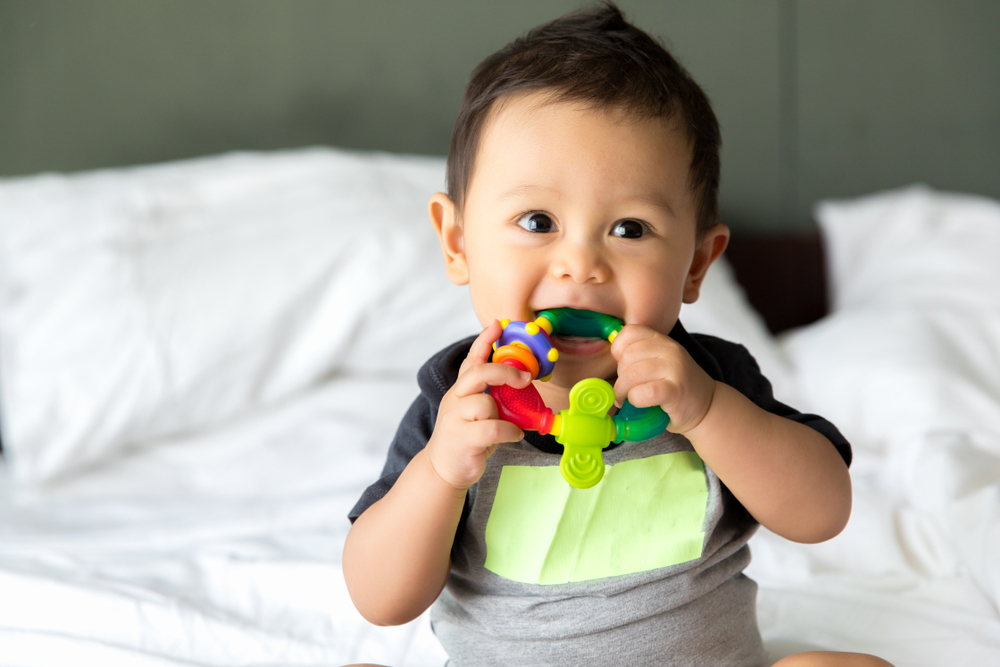Survival Guide for Infant Teething
The first year of your baby’s life is incredible. They start off as a helpless little bundle and wrap up the year as their own tiny person. Most of us look forward to the milestones that occur at this time like the first smile, the first laugh and, of course, the first time they sleep through the night. But, there’s one other major milestone that usually kicks off in infancy that many parents dread. Yup, we’re talking about infant teething.
As a Washington, DC pediatric dentist and mom, Dr. Roya Pilcher has been around her fair share of teething infants. She knows just how tough it can be when your baby is irritable or waking up in the middle of the night again after you’re finally getting sleep. The good news is that for most infants, teething symptoms are pretty mild. And, while the first few teeth are usually the most difficult since it’s a new sensation, teething tends to get easier with each tooth.
By knowing what to expect during the process and how to soothe a teething baby, you’ll feel more prepared and able to get through this period with ease. In this post, we’ll cover:
- What age do babies start teething?
- What are the teething symptoms?
- What are the best infant teething remedies?
- What teething remedies are not safe?
- Tips for soothing a teething baby at night
What Age Do Babies Start Teething?
As with anything related to kids, there’s a pretty wide range when it comes to the age babies start teething. Most babies get their first tooth between 6 months and 1 year. The teething order can vary a bit, but baby teeth often erupt in pairs with the lower front teeth (lower central incisors) usually the first to come in, followed by the upper front teeth (upper central incisors).
Your child will have baby teeth coming in throughout their first few years of life. The American Dental Association has an excellent baby teeth eruption chart that illustrates the timeline. Most children have a full set of primary teeth between the age of 2 and 3.
Does teething hurt babies? Teething is not an excruciating experience, but your infant’s gums can be sore as their baby teeth come in. Some babies barely seem phased by it while others are more uncomfortable.
What are the Common Teething Symptoms?

Teething symptoms include:
- Drooling
- Face rash (a rash can develop due to the drool irritating the skin)
- Chewing on things more than usual
- Swollen, red and/or sore gums
- Fussiness and irritability
- Trouble sleeping
- Loss of appetite
There are some other symptoms that are commonly associated with teething. Let’s go over whether or not these are actually signs of teething or if they’re an indication that something else is going on:
Is diarrhea a symptom of teething?
You’ve probably read or heard that teething can cause diarrhea. However, most medical professionals don’t believe diarrhea is a symptom of teething. If your infant has diarrhea, it’s a good idea to call your pediatrician, because whether it’s from teething or not, it can still lead to dehydration.
That said, while teething might not directly result in diarrhea, it’s not uncommon for infants to have diarrhea at the same time as their teeth are coming in. Why? Well, most infants start on solid foods between 6 months and a year, which can sometimes irritate their intestinal tract. Additionally, according to Seattle Children’s, at around 6 months, babies begin to lose the antibodies that were transferred from mother to baby at birth, causing an increase in infections and illnesses. Infants at this age, especially when teething, are also prone to putting everything and anything in their mouth, which can allow bacteria and viruses to enter their body.
Is a runny nose a symptom of teething?
Whether or not a runny nose is a symptom of teething is up for debate. A study published in Pediatrics did find a correlation between a mild runny nose and the eruption of primary teeth. However, other experts and studies haven’t found an association between the two. If a runny nose lasts more than 24 hours after the tooth comes in and is moderate or severe, then it’s not from teething and is more likely a cold or allergies.
Does teething cause a fever?
Teething can cause a slight rise in temperature in infants due to the inflammation. The same study in the journal Pediatrics that found a link between teething and a runny nose, also discovered an increased temperature in teething infants on the day their baby tooth erupted and the day before. The infants didn’t have what doctors would consider a fever, which is a temperature of 100.4 F or higher. So, if your tiny tot has a true fever and it continues after the day their tooth comes in, give your pediatrician a call.
Does teething cause excessive crying?
As we said, teething can be uncomfortable for babies, particularly with the first several teeth since it’s a new sensation. While irritability, a little more fussiness and a bit of crying are normal, if your child is inconsolable, there could be something else going on and you may want to reach out to your doctor.
Is diaper rash a symptom of teething?
No. Teething can lead to a rash around your infant’s mouth because of all of the drool, but it doesn’t directly cause a rash elsewhere on the body, including diaper rash. Nonetheless, diaper rash can follow diarrhea, so if your child gets a mild illness from chewing on things while teething, then, yes, they could have diaper rash at the same time that a tooth is erupting.
Does teething cause earaches?
The eruption of baby teeth doesn’t cause ear infections, which are the result of a virus or bacteria, but pain from a teething infant’s gums can radiate to the ear. Plus, it’s difficult for young children to precisely locate where pain is coming from. That’s why it’s not uncommon for kids to pull at their ear or rub their cheek when their back teeth come in.
What are the Best Infant Teething Remedies?
There are so many baby teething remedies on the market today, it can be a little bit overwhelming. Here are the safest, tried-and-true solutions to manage your baby’s teething pain:
- One of the best natural teething remedies is to simply use a clean finger or a moistened sterile gauze pad to massage your infant’s gums. Applying counter-pressure actually helps to alleviate discomfort.
- Soak a washcloth in water or breast milk and stick it in the fridge or freezer to get it nice and cold. Give it to your infant to chew on.
- If your teething infant’s gums are swollen or sore, gently press on their gums using the rounded side of a spoon that has been chilled in the refrigerator. Don’t chill spoons in the freezer as the metal can get too cold and be sure you only do this before the tooth erupts, so you don’t accidentally chip their baby tooth.
- Offer your baby teething toys to chew on. Look for plush teething toys or solid, BPA-free toys made with safe materials. Avoid teething toys that are filled with liquid since babies can chew through them causing the liquid to seep out. Put solid teething toys in the refrigerator to get them cold and then let your infant chew away.
- If your infant has started on solid food, feed them chilled fruit or vegetable purees to help numb their gums. You can also fill a mesh feeder with cold fruit and give it to them to chew on.
- Teething biscuits can be helpful too. Most brands recommend holding off on giving them to babies until around 8 months, so be sure to check the package. After your baby has a biscuit, you can wipe down their gums.
- Harness the power of distraction! If your infant is irritable, go for a walk, read them a book, or play a game to get their mind off of their discomfort.
- If your baby is waking up in the middle of the night or extremely cranky, and other teething remedies aren’t working, talk with your pediatrician about giving them an over-the-counter pain reliever like Tylenol or Motrin.
What Teething Remedies are Not Safe?
When trying to relieve your baby’s teething pain, avoid:
Teething medications that contain lidocaine or benzocaine.
Over-the-counter products containing these ingredients, such as Baby Orajel and Anbesol, can be dangerous, or even deadly, for infants, and research suggests they offer little to no benefit.
Teething necklaces, bracelets or anklets.
These are billed as natural teething remedies, but the American Academy of Pediatrics and the FDA warn that teething jewelry, such as amber teething necklaces, are a strangulation and choking hazard. If you do decide to use a teething necklace or bracelet, supervise your baby while they’re chewing on it, remove it while your child is sleeping and put it on their wrist or ankle instead of around their neck.
As for the teething necklaces that parents can wear, you’ll want to exercise caution with those as well. Keep an eye on your child while they’re chewing it and purchase the jewelry from a reputable source that clearly labels all of the materials used. Certain materials have been found to contain lead.
Homeopathic teething tablets and medications.
The FDA also urges parents to avoid homeopathic teething tablets and medications. Varying amounts of belladonna, a toxic substance, were found in homeopathic teething tablets, often far exceeding the amount listed on the package. This is especially risky for children under the age of 2.
Additionally, the FDA doesn’t evaluate homeopathic teething remedies, making it impossible to determine if the products are safe or their claims are accurate. If you’re looking for natural teething remedies, go with the most natural one of all: massaging your baby’s gums with your finger!
Tips for Soothing a Teething Baby at Night
It can often seem as if teething gets worse at night. However, this is mainly because your baby is tired and they aren’t surrounded by distractions like they are during the day. While things like going for a walk or feeding them chilled fruit purees are great for the daytime, how do you soothe a teething baby at night? Try the following tips to help your infant (and you!) catch some zzz’s:
- Stick with your normal bedtime routine even while your baby’s teething. The familiarity will help them cope and calm down before bed. Plus, deviating from their routine will interfere with their sleep even more.
- Let your baby chew on that cold washcloth soaked in water or breastmilk before bed.
- After feeding your infant and giving them something cold to chew on, use a wet piece of gauze or an infant finger toothbrush to gently clean and massage their gums.
- Wipe away any drool before putting your baby down since the drool can irritate their skin and cause an uncomfortable rash around their mouth. You may also want to use a baby-safe moisturizer on the area.
- Consider placing on a white noise machine on a low volume in your baby’s room while they’re teething. A study published in BMJ found that babies were more likely to fall asleep within five minutes when exposed to white noise. The researchers noted it could be a good way to settle difficult babies, and teething infants can definitely fall into that category.
- If your baby wakes up, wait a few minutes to see if they’ll self-soothe and go back to sleep. If they don’t, then try comforting them.
- As mentioned before, as a last resort, if your baby is constantly getting up in the middle of the night because their gums are sore and nothing else is helping, ask your pediatrician about giving them an over-the-counter pain reliever like Tylenol.
- Try to maintain perspective and keep in mind that teething is only temporary. Obviously, when you’re not getting enough sleep and your infant is fussy, this can seem like a tall order. But the truth is, teething doesn’t last forever and symptoms typically run their course in a few days. Take care of yourself and, if you’re feeling stressed and overwhelmed, set aside time to do things that relax you.
Caring for Your Baby’s First Teeth
When your baby gets their first tooth, you can start brushing it with an infant-sized, soft-bristled toothbrush and a tiny smear of fluoride toothpaste (no larger than a grain of rice). You can begin flossing once a day as soon as any two teeth are touching.
The American Academy of Pediatric Dentistry recommends kids have their first dental visit by their first birthday. While these early visits are mainly to help your child get used to going to the dentist, babies can get cavities as soon as the first tooth erupts.
Schedule a Visit at Smile Valley Pediatric Dentistry in Spring Valley!
If you’re still struggling after trying different teething remedies or your baby is approaching their first birthday, schedule an appointment at Smile Valley Pediatric Dentistry in Spring Valley, DC. Dr. Roya will examine your baby’s teeth and gums, offer personalized suggestions for managing teething and teach you how to take care of your child’s smile as it develops. At our bright, friendly office, we put our patients at ease to make dental visits stress-free and fun for little ones and parents.











